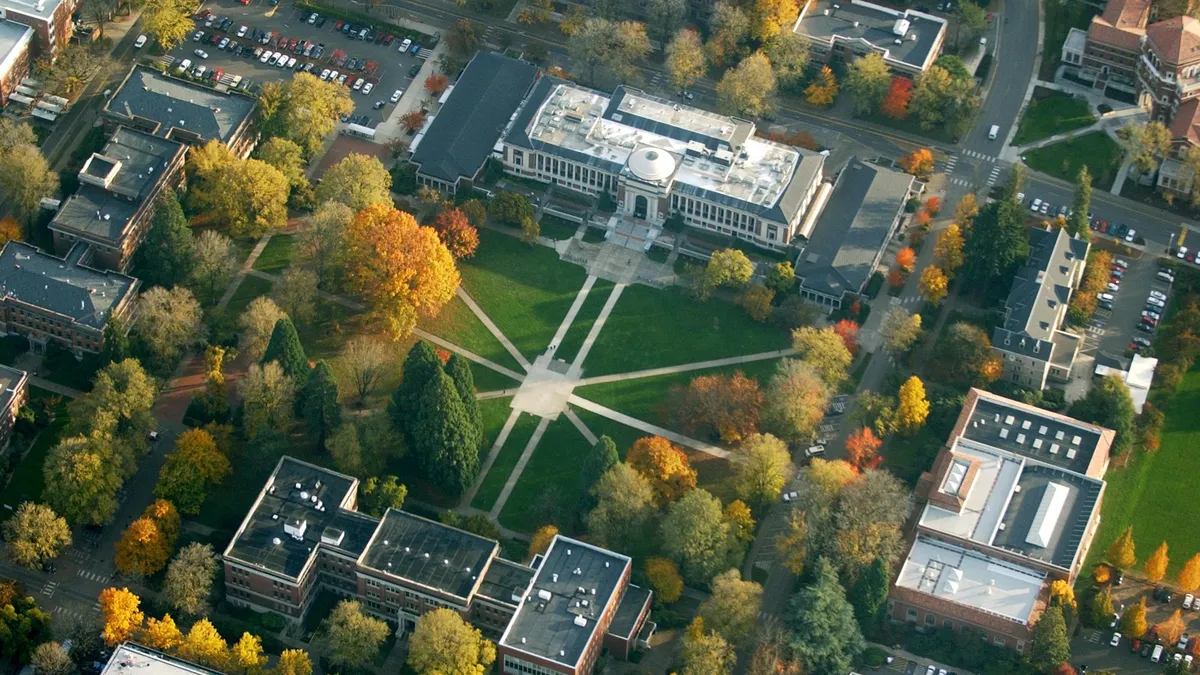Judith Wilde is research professor and James Finkelstein is professor emeritus in the Schar School of Policy and Government at George Mason University.
This is the last of three pieces in a series they wrote examining changes in the way college presidents are hired. The first is available here, and the second is available here.
The average tenure of a college president has fallen by 1.5 to 2 years in recent decades. It was just 6.5 years in 2016, according to the American Council on Education's 2017 American College Presidency study, and our research also found the average tenure of a college president to be 6.5 years in 2016, down from 8.5 years in 2006. One reason for this is the increasing number of presidents not completing their contracts — by choice, by mutual agreement or by termination. As a result, more presidential searches are being conducted than ever before.
Turnover in presidencies carries a real cost to universities — both in dollars and in less-tangible aspects. The engagement fee for a presidential search at a major university can exceed $200,000, plus the university's internal costs and reimbursements for the search firm's direct expenses. A failed presidency can lessen the institution's reputation.
What do the governing boards think?
Some governing boards are beginning to appreciate these issues. The Oregon State University Board of Trustees recently undertook an internal study to determine why their 2019 presidential search didn't uncover information about the final candidate at his previous institution, information that forced his resignation from the presidency in less than a year. After South Carolina State University's president resigned, the board chair announced, "I would like committee members to be trained on what they should be doing on a search committee versus just coming in raw as a board member that has not done this before."
Most governing board members have no previous experience hiring a president. They see a search as time consuming, expensive, frustrating and exhausting. Further, university trustees are volunteers. Many are not reimbursed for their expenses, and most have full-time jobs. Nonetheless, they are fiduciaries with substantial responsibilities for multimillion-dollar enterprises. Governing boards feel they have neither the expertise nor the time for a presidential search — hence the ubiquitous search firms.
Given the increasing presence of business leaders on governing boards, there has been little hesitancy to take the corporate approach — to outsource their single most important responsibility to an executive search firm. As we noted previously, at least 92% of presidential searches are conducted with a headhunter. However, it is unclear, based on the backgrounds of those who lead these firms, whether their understanding of higher education is in any way superior to that of the governing boards.
How can we do better?
What can be done to improve the outcomes of presidential searches — to increase the probability of identifying a president who meets the needs of the institution, has the requisite skills and knowledge, and exhibits the personal attributes that will allow the president to be successful?
First, based on our research, it is essential that the institution, not the search firm, maintain control of the search. Beware of so-called listening sessions conducted by search firms. They often are little more than a cover for ultimately justifying a secret search.
To identify the true needs of the institution may require a full year of meetings, focus groups and surveys. It may involve students, staff, faculty and the local community. Once strengths and challenges are known, the true work can begin.
Second, with this knowledge, the search committee, not the search firm, can create a detailed job announcement. This should state the specific requirements for the president and identify any other attributes, skills or knowledge that would be helpful or preferred. Any hot-button areas that are important to the institution should be listed as well.
Only when this introspective process is complete should the institution — the governing board, faculty, and staff — determine what role, if any, a search firm should play in the process of selecting a new president. If a search firm is to be hired, the university should develop a detailed request for proposals and use its standard procurement process for awarding a contract. While the contract for services may be for $100,000 to $200,000, what the institution is really "buying" is a new president, as the monetary value of the president's contract will likely be several million dollars. In fact, the hiring of a president may be a university's costliest procurement.
Next, it is essential to know who is doing the work. A senior partner, or even the owner, may be the face of the firm but do little of the actual work. In our most recent study, we found that only five leaders at four top higher education search firms had been a university president. Just two had served as president, provost and dean through their careers. Nearly 40% of the firms were run by someone with only a bachelor's degree. It is important not just to know the senior partner of the firm, but to know with whom the search committee will be working, including which specific search firm or search committee personnel will be responsible for each task that is important to the search. Who will do the first review of applications? Who will meet with candidates? Who will perform reference checks?
The contract for services must be well written and detailed. In our first study of executive search firms, one of the most surprising findings was that 57% of the contracts were created by the search firm, and 61% of those were merely letters of agreement on search firm stationery. The scope of work as well as contract terms and conditions must protect the university's interests, not those of the search firm or candidates. The final contract should include a detailed list of tasks, timelines, milestones, staffing, deliverables, indemnification, warranties and performance measures. As best practice, there should be a contracting officer for the institution as well as a technical representative to oversee the search firm's work and certify performance.
Finally, given the potential cost of hiring the wrong person, search firms should not be involved in conducting due diligence on the final candidates or in contract negotiations. Due diligence should be handled by an independent human resources expert or private investigator who will warrant their findings. We often find the faculty grapevine to be the most thorough form of due diligence. And, just as many presidents are represented by their own attorneys who are experienced in executive employment matters, universities should consider being represented by counsel experienced in such employment issues as well.
These recommendations may sound harsh, but they protect the interests of both the institution and the search firm.













